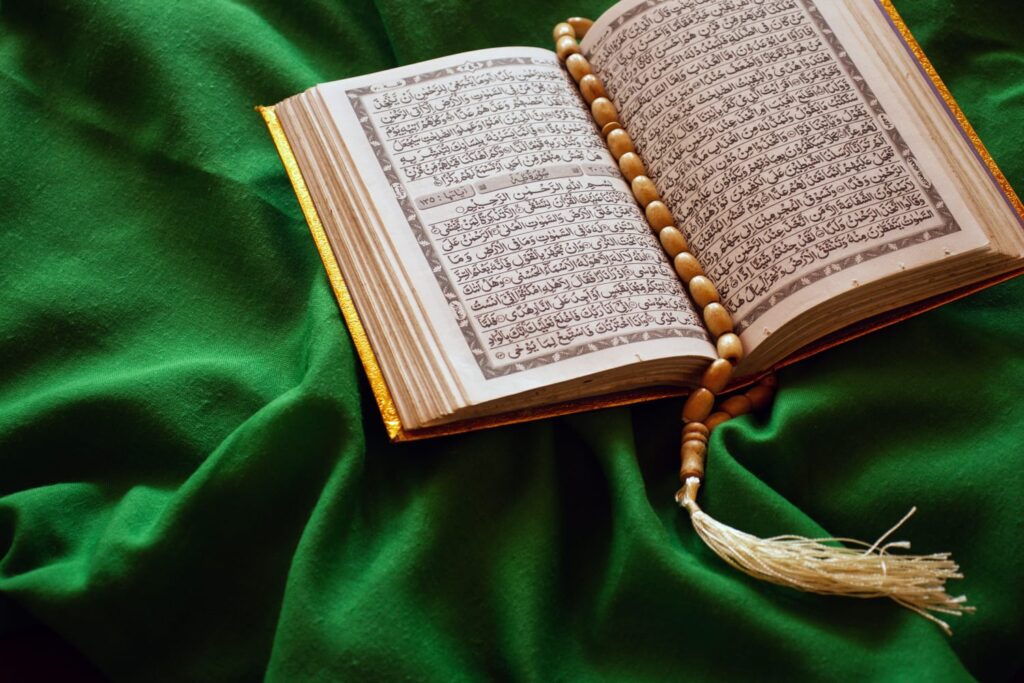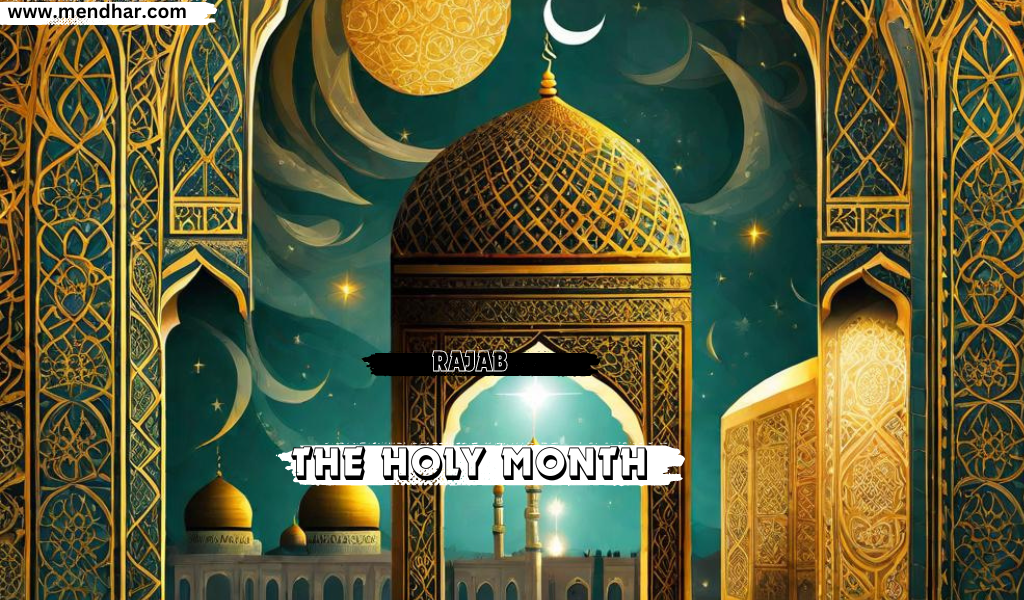Table of Contents
ToggleUnderstanding The order of amulets in the light of Quran and Hadeeth:
تعویذات کا حکم قرآن اور حدیث کی روشنی میں
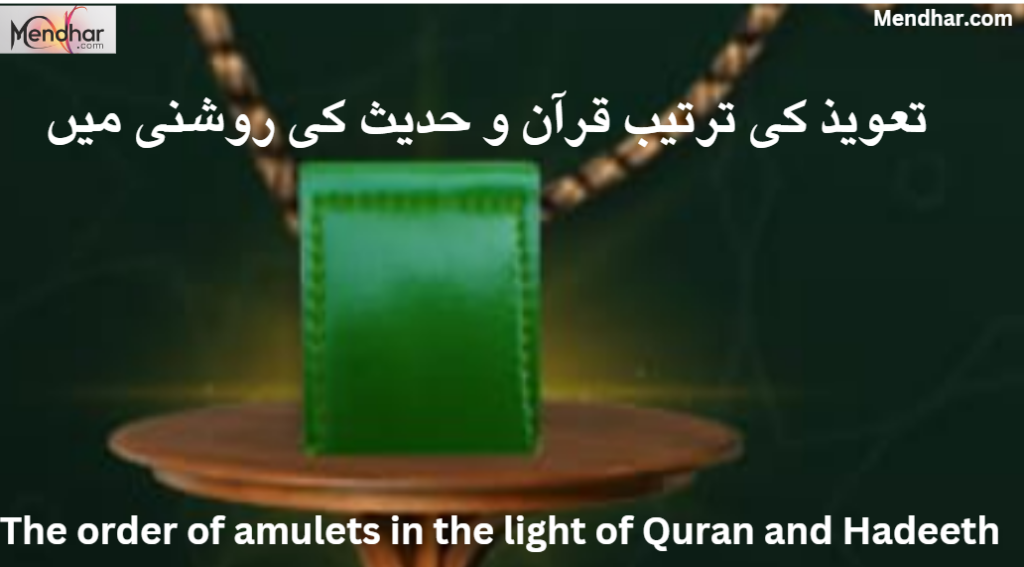
Allah Almighty has created humans and connected them with various things, one of which is illness. When a person falls ill, they adopt various methods to seek healing. Among these methods are supplications and remedies according to the Quran and Sunnah. ‘Taweezat’ is the plural of ‘Taweez,’ which in Arabic is called ‘Tameemah.’ In the era of ignorance (pre-Islamic era), when someone fell under an evil eye, the Arabs used to recite some words and blow over them, as reported by Hazrat Auf bin Malik Al-Ashja’i (may Allah be pleased with him), who said: “In the pre-Islamic era, when we did this, we asked the Messenger of Allah (peace be upon him) about it. He said: ‘Show it to me.’ There is nothing wrong with these as long as they do not involve shirk (associating partners with Allah).” (Sahih Muslim) Sometimes, they would write something and hang it around the neck, calling it ‘Tameemah.’ In our society, where a large number of people derive benefits from this practice, some people label it as shirk (associating partners with Allah) and innovation. Let us understand its legal status in the light of the Quran and Sunnah.”
“اللہ تعالیٰ نے انسانوں کو پیدا کیا اور ان کو مختلف چیزوں سے منسلک کیا، جن میں سے ایک بیماری بھی ہے۔ جب انسان بیمار ہوتا ہے، تو وہ مختلف طریقوں کو اپناتا ہے تاکہ علاج حاصل کر سکے۔ ان طریقوں میں سے ایک طریقہ قرآن و سنت کے مطابق دعاؤں اور علاجات ہیں۔ ‘تعویذات’ تعویذ کی جمع ہے، اور عربی میں اسے ‘تمیمہ’ کہا جاتا ہے۔ جاہلیت کی دور میں جب کوئی شخص بدنظری کا شکار ہوتا تھا، تو عرب لوگ کچھ الفاظ پڑھ کر ان پر دم کیا کرتے تھے، جیسا کہ حضرت عوف بن مالک الاشجعی (رضی اللہ عنہ) نے روایت کیا: “جاہلیت کی دور میں، جب ہم ایسا کرتے تھے، ہم نے رسول اللہ (صلی اللہ علیہ وآلہ وسلم) سے اس بارے میں پوچھا۔ آپ نے فرمایا: ‘مجھے دکھائو۔’ جب تک کہ وہ شرک نہ ہوں، ان میں کچھ بری بات نہیں۔” (صحیح مسلم) کبھی کبھار، لوگ کچھ لکھ کر اسے گردن میں لٹکا دیتے تھے، اسے ‘تمیمہ’ کہا جاتا تھا۔ ہمارے معاشرت میں، جہاں بہت سے لوگ اس عمل سے فوائد حاصل کرتے ہیں، وہاں کچھ لوگ اسے شرک اور بدعت قرار دیتے ہیں۔ آئیے قرآن و سنت کی روشنی میں اس کی شرعی حیثیت کو سمجھیں۔”
“Quran, Hadith, and Amulets:
Generally, talismans contain verses from the Holy Quran and the names of Allah, and they are recited for blessings. Therefore, the one who utilizes talismans seeks healing from the Quran, and undoubtedly, there is healing in the Noble Quran, as Allah Almighty guides:
‘And We send down of the Quran that which is healing and mercy for the believers.’ (Surah Al-Isra, 17:82)
This same concept is also found in Hadith, as narrated by Hazrat Ali (may Allah honor his face), that the Messenger of Allah (peace be upon him) said: ‘The best medicine is the Quran.’ (Ibn Majah)
The Messenger of Allah (peace be upon him) himself dictated talismans.”
“قرآن، حدیث، اور تعویذات:
عموماً، تعویذات میں قرآن کی آیات اور اللہ کے اسماء شامل ہوتے ہیں، اور انہیں پڑھ کر فائدہ اٹھایا جاتا ہے۔ لہذا، تعویذات کا استعمال کرنے والا قرآن سے شفا حاصل کرنا چاہتا ہے، اور یقیناً، قرآن کریم میں شفا ہے۔ اللہ تعالیٰ کا فرمان ہے:
‘وَنُنَزِّلُ مِنَ الْقُرْآنِ مَا هُوَ شِفَاءٌ وَرَحْمَةٌ لِّلْمُؤْمِنِينَ’ (سورة الإسراء، ۱۷:۸۲)
یہی مضمون حدیث میں بھی موجود ہے، جیسا کہ حضرت علی کرّم اللہ وجہہ الکریم کی روایت میں آیا ہے کہ رسول اللہ صلی اللہ علیہ وآلہ وسلم نے فرمایا: ‘خیر الدواء القرآن’ یعنی قرآن بہترین دوائی ہے۔ (ابنِ ماجہ)
رسول اللہ صلی اللہ علیہ وآلہ وسلم نے خود تعویذات لکھوائیں۔”
It is narrated by Hazrat Abu Dujanah (may Allah be pleased with him) that I complained to the Messenger of Allah (peace be upon him) while I was lying down on the bed, saying: “O Messenger of Allah! I heard a sound in my house like the sound of a millstone moving, and I heard a buzzing sound like that of bees, and I saw a flash of lightning like the lightning. I got scared and looked, and there was a black shadow rising in the courtyard of the house. I went near it and touched its skin, which felt like the skin of a horse with thorns. Then it threw something like the sparks of fire on my face, and it felt as if it had burned me.”
The Noble Prophet (peace be upon him) then said, “O Abu Dujanah! There is a harmful creature in your house, by the Lord of the Kaaba, O Abu Dujanah! Your example is such that people are tormented by it.” Then he said, “Bring me a paper and some perfume.” I brought both items, and when I presented them, the Holy Prophet (peace be upon him) handed them to Hazrat Ali (may Allah honor his face) and said, “O Abu Al-Hasan, write.” Hazrat Ali asked, “What should I write?” The Holy Prophet (peace be upon him) replied, “Write this.“
بِسْمِ اللہِ الرَّحْمٰن ِالرَّحِیْم ھٰذَا کِتَابٌ مِّنْ مُّحَمَّدِِ رَّسُوْلِ رَبِّ الْعَالَمِیْنَ صَلَّی اللہُ تَعَالٰی عَلَیْہِ وَاٰلِہٖ وَسَلَّم اِلٰی مَنْ طَرَقَ الدَّارَمِّنَ الْعُمَّارِ وَالزُّوَارِوَالصَّالِحِیْنَ اِلَّا طَارِقاً یَّطْرُقُ بِخَیْرٍ یَّا رَحْمٰنُ اَمَّا بَعْدُ :فَاِنَّ لَنَا وَلَکُمْ فِیْ الْحَقِّ سَعَۃً ،فَاِنْ تَکُ عَاشِقاً مُوْلِعاً، فَاجِراً مُقْتَحِماً أَوْ رَاغِباً حَقّاً أَوْ مُبْطِلاً،ھٰذَا کِتَابُ اللہِ تَبَارَکَ وَ تَعَالٰی یَنْطِقُ عَلَیْنَا وَعَلَیْکُمْ بِالْحَقِّ ،اِنَّا کُنَّا نَسْتَنْسِخ ُ مَا کُنْتُمْ تَعْلَمُوْنَ وَرُسُلُنَا یَکْتُبُوْنَ مَاتَمْکُرُوْنَ، اُتْرُکُوْا صَاحِبَ کِتَابِیْ ھٰذَا وَانْطَلِقُوْا اِلٰی عَبْدَۃِ الْاَصْنَامِ وَاِلٰی مَنْ یَّزْعَم ُاَنَّ مَعَ اللہِ اِلٰہًا آخَر لَااِلٰہَ اِلَّا ھُوَ کُلُّ شَیْءٍ ھَالِکٌ اِلَّا وَجْھَہ لَہُ الْحُکْمُ وَ اِلَیْہِ تُرْجَعُوْنَ یُغْلَبُوْنَ حٰم لَا یُنْصَرُوْنَ حٰم عسق، تُفَرَّقُ اَعْدَاءُ اللہ ِ،وَبَلَغَتْ حُجَّۃُ اللہِ وَلَا حَوْلَ وَلَا قُوَّۃ اِلَّا بِا اللہِ فَسَیَکْفِیْکَھُمُ اللہُ وَھُوَ السَّمِیْعُ الْعَلِیْمُ۔
حضرت ابو دُجانہ رضی اللہ عنہ سے روایت ہے کہ میں نے حضور صَلَّی اللہُ عَلَیْہِ وَسَلَّم کی بارگاہ میں (جنات کی) شکایت کرتے ہوئے عرض کیا: “یا رسولُ اللہ! میں بستر پر لیٹا ہوا تھا کہ اچانک میں نے اپنے گھر میں ایک آواز سنی جو کہ چکی چلنے کی طرح تھی، اور ایک بھنبھناہٹ سنی جو شہد کی مکھیوں کی مثل تھی، اور بجلی کی چمک جیسی چمک دیکھی۔ میں نے گھبرا کر سراٹھا کر دیکھا، تو ایک سیاہ سایہ تھا جو کہ گھر کے صحن میں بلند ہوتا جارہا تھا۔ میں نے اس کے قریب جا کر اس کی کھال کو چھوا، تو اس کی کھال ساہی (ایک کانٹے دار کھال والا جانور) کی کھال کی طرح تھی۔ پھر اس نے میرے چہرے پر آگ کے چنگاریوں کی مثل کوئی چیز پھینکی، تو مجھے ایسا لگا گویا اس نے مجھے جلا کر رکھ دیا ہے۔”
نبی کریم صَلَّی اللہُ عَلَیْہِ وَسَلَّم نے ارشاد فرمایا: “اے ابو دُجانہ! تیرے گھر میں ایک بری چیز رہنے والی ہے، ربِّ کعبہ کی قسم اے ابو دُجانہ! تیری مثل لوگ تکلیف دئیے جاتے ہیں۔” پھر فرمایا: “ایک کاغذ اور دوات لا،” میں دونوں چیزیں لے کر حاضر ہوا تو سرکارِ اقدس صَلَّی اللہُ عَلَیْہِ وَسَلَّمْ نے حضرت علی کَرَّمَ اللہُ وَجْہَہُ الْکَرِیْم کو دے کر فرمایا: “اے ابوالحسن! لکھو!” انہوں نے عرض کیا کہ “کیا لکھوں؟” فرمایا: “یہ لکھو۔”
بِسْمِ اللہِ الرَّحْمٰن ِالرَّحِیْم ھٰذَا کِتَابٌ مِّنْ مُّحَمَّدِِ رَّسُوْلِ رَبِّ الْعَالَمِیْنَ صَلَّی اللہُ تَعَالٰی عَلَیْہِ وَاٰلِہٖ وَسَلَّم اِلٰی مَنْ طَرَقَ الدَّارَمِّنَ الْعُمَّارِ وَالزُّوَارِوَالصَّالِحِیْنَ اِلَّا طَارِقاً یَّطْرُقُ بِخَیْرٍ یَّا رَحْمٰنُ اَمَّا بَعْدُ :فَاِنَّ لَنَا وَلَکُمْ فِیْ الْحَقِّ سَعَۃً ،فَاِنْ تَکُ عَاشِقاً مُوْلِعاً، فَاجِراً مُقْتَحِماً أَوْ رَاغِباً حَقّاً أَوْ مُبْطِلاً،ھٰذَا کِتَابُ اللہِ تَبَارَکَ وَ تَعَالٰی یَنْطِقُ عَلَیْنَا وَعَلَیْکُمْ بِالْحَقِّ ،اِنَّا کُنَّا نَسْتَنْسِخ ُ مَا کُنْتُمْ تَعْلَمُوْنَ وَرُسُلُنَا یَکْتُبُوْنَ مَاتَمْکُرُوْنَ، اُتْرُکُوْا صَاحِبَ کِتَابِیْ ھٰذَا وَانْطَلِقُوْا اِلٰی عَبْدَۃِ الْاَصْنَامِ وَاِلٰی مَنْ یَّزْعَم ُاَنَّ مَعَ اللہِ اِلٰہًا آخَر لَااِلٰہَ اِلَّا ھُوَ کُلُّ شَیْءٍ ھَالِکٌ اِلَّا وَجْھَہ لَہُ الْحُکْمُ وَ اِلَیْہِ تُرْجَعُوْنَ یُغْلَبُوْنَ حٰم لَا یُنْصَرُوْنَ حٰم عسق، تُفَرَّقُ اَعْدَاءُ اللہ ِ،وَبَلَغَتْ حُجَّۃُ اللہِ وَلَا حَوْلَ وَلَا قُوَّۃ اِلَّا بِا اللہِ فَسَیَکْفِیْکَھُمُ اللہُ وَھُوَ السَّمِیْعُ الْعَلِیْمُ۔
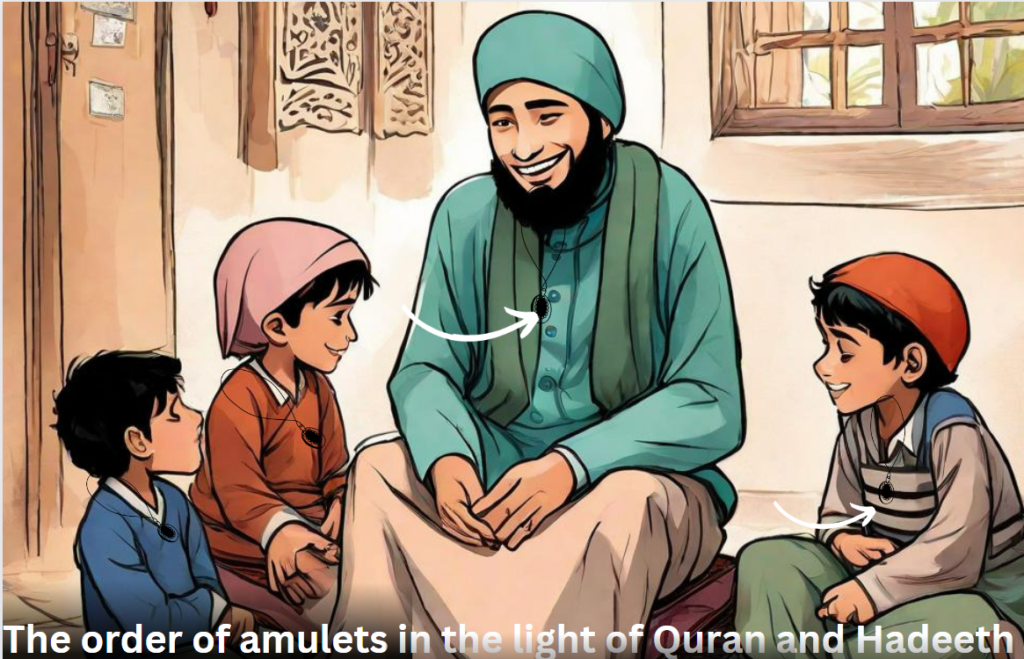
Hazrat Abu Dujanah (may Allah be pleased with him) narrates: I brought it wrapped up to the house and laid it down beneath my head and went to sleep. Suddenly, I got up with a startle from a loud noise. It was saying, “O Abu Dujanah! By the oath of Lat and Uzza, these words have burned us. By the oath of your master, when he takes this writing from us, we will neither return to your house (as per one narration: nor inflict any harm upon you), nor will we come to your neighborhood, nor will we come to the place where this writing (talisman) is.” Abu Dujanah says: I said to them: “By the oath of my master (meaning the Messenger of Allah, peace be upon him), I will not take it off until I seek permission from the Noble Prophet, peace be upon him.” Abu Dujanah (may Allah be pleased with him) says: When I was sighing and lamenting due to the jinn, the night became long for me, to the extent that it was morning. I performed the Fajr prayer with the Noble Prophet, peace be upon him, and when the conversation about the jinn occurred in the evening, you, peace be upon him, said: “O Abu Dujanah! Take this talisman from the people, for I swear by the One who sent me with the truth, they will be afflicted with torment until the Day of Judgment.” (Al-Khasais al-Kubra)
حضرت ابو دجانہ رضی اللہ عنہ بیان کرتے ہیں: “میں نے اس کو لپیٹ کر گھر لے آیا اور رات کو اپنے سر کے نیچے رکھ کر سو گیا۔ ایک دم میں نے ایک چلانے والے کی چیخ سے اُٹھا، وہ کہہ رہا تھا: ‘اے ابو دجانہ! لات و عزّا کی قسم، ان کلمات نے ہمیں جلا دیا ہے۔ تیرے مالک کی قسم، جب تو اس تحریر کو ہم سے اٹھائے گا، ہم نہ تو تیرے گھر واپس آئیں گے (ایک روایت میں یہاں تک کہ نہ ہم تجھے ایذا دیں گے)، اور نہ تیرے پڑوس میں کبھی آئیں گے، اور نہ اس جگہ آئیں گے جہاں یہ تحریر (تعویذ) ہوگی۔’ ابو دجانہ کہتے ہیں کہ میں نے ان سے کہا: ‘میرے مالک (یعنی رسولُ اللہ صَلَّی اللہُ عَلَیْہِ وَسَلَّم) کی قسم، کہ میں اسے اتنے وقت تک نہ اٹھاؤں گا جب تک نبی کریم صَلَّی اللہُ عَلَیْہِ وَسَلَّم سے اجازت نہ مانگ لوں۔’ حضرت ابو دجانہ رضی اللہ عنہ کہتے ہیں: ‘جب میں جنوں کی آہ و بکاسنی تھی، رات لمبی ہوگئی، یہاں تک کہ صبح ہوگئی، تو میں نے نبی کریم صَلَّی اللہُ عَلَیْہِ وَسَلَّم کے ساتھ صبح کی نماز پڑھی، اور رات کو جنوں سے ہونے والامکالمہ بیان کیا، تو آپ صَلَّی اللہُ عَلَیْہِ وَسَلَّمْ نے فرمایا: ‘اے ابو دجانہ! اس قوم سے اس تعویذ کو اٹھا لو، کیونکہ مجھے قسم ہے اس ذات کی جس نے مجھے حق کے ساتھ مبعوث فرمایا! وہ قوم قیامت تک عذاب کی تکلیف میں مبتلارہے گی۔’ (الخصائص الکبریٰ)”
Famous companion Hazrat Abdullah bin Umar (may Allah be pleased with him) and Amulets:
Imam Ahmad bin Hanbal (may Allah be pleased with him) narrates: Hazrat Syedna Abdullah bin Umar (may Allah be pleased with him) used to instruct his adult children to recite these words before sleeping: “Bismillah, A’uzu billahi tammati min ghadabihi wa ‘iqabihi wa sharri ‘ibadihi wa min hamazatish shayateen wa an yahdurun.” And for those who were not yet mature and couldn’t remember, you (may Allah be pleased with him) would write down the mentioned words and tie them as talismans around the children’s necks. (Musnad Ahmad)
مشہور صحابی حضرت عبد اللہ بن عمر (رضی اللہ عنہ) اور تعویذ:
حضرت امام احمد بن حنبل (رضی اللہ عنہ) نقل فرماتے ہیں: حضرت سیدنا عبداللہ بن عمر (رضی اللہ عنہما) اپنے بالغ بچوں کو سوتے وقت یہ کلمات پڑھنے کی تلقین فرماتے: “بِسْمِ اللہِ اَعُوْذُ بِکَلِمَاتِ اللہِ التَّامَّۃِ مِنْ غَضَبِہِ وَعِقَابِہِ وَشَرِّ عِبَادِہِ وَمِنْ ہَمَزَاتِ الشَّیَاطِیْنِ وَاَنْ یَحْضُرُوْنَ”۔ اور ان میں سے جو نابالغ ہوتے اور یاد نہ کرسکتے، تو آپ (رضی اللہ عنہ) مذکورہ کلمات لکھ کر ان کا تعویذ بچوں کے گلے میں ڈال دیتے۔ (مسند احمد)
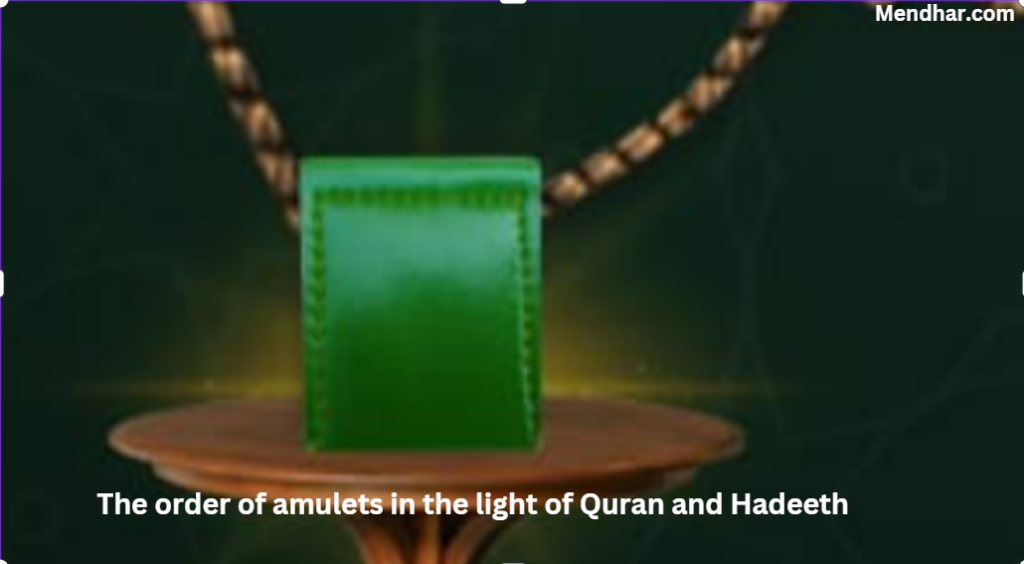
Famous Tabi’i Saeed bin Musayyab, Ibn Sirin, and Talismans:
Hazrat Syedna Saeed bin Musayyab (may Allah be pleased with him) said: There is no harm in placing Quranic talismans wrapped in a cloth or paper, as Imam Ibn Sirin (may Allah have mercy on him) did not see any harm in writing something from the Quran and hanging it around someone’s neck. (Al-Bahr al-Muhit)
Amulets for Drinking:
Hazrat Syedna Ibn Abbas (may Allah be pleased with him) narrates: When childbirth becomes difficult for a woman, the following verses and words should be written on a piece of paper: “Bismillah, Allahu Akbar, Subhan Allahi Rabbis samawati wa Rabbil arshil azim, k’annahum yawma yarawnaha lam yalbathu illa ashiyyatan aw duhaaha, k’annahum yawma yarawna mayoo’aduna lam yalbathu illa sa’atan minan nahari balagh, fahal yuhlaku illal qawmul fasiqoon.” Then it should be dissolved in water and given to the woman to drink. (Zad al-Ma’ad li Ibn al-Qayyim, Vol. 4, Page 328)
مشہور تابعی سعید بن مسیب، ابن سیرین اور تعویذ:
حضرت سیدنا سعید بن مسیب (رضی اللہ عنہ) فرماتے ہیں: قرآنی تعویذ کو کسی ڈبیہ یا کاغذ میں لپیٹ کر لٹکانے میں کوئی حرج نہیں، امام ابن سیرین (رحمت اللہ علیہ) اس میں کوئی حرج نہیں سمجھتے کہ قرآن میں سے کچھ لکھ کر کسی انسان کے گلے میں لٹکایا جائے۔ (البحر المحیط)
حضرت ابن عباس (رضی اللہ عنہ) کی طرف سے گھول کر پینے والا تعویذ:
حضرت سیدنا ابن عباس (رضی اللہ عنہما) فرماتے ہیں: جب عورت پر بچے کی پیدائش مشکل ہوتو ایک کاغذ پر یہ دو آیات اور کلمات لکھے جائیں، “بِسْمِ اللہِ الرَّحْمٰنِ الرَّحِیْم لَااِلٰہَ اِلَّا اللہُ الْعَظِیْمُ الْحَلِیْمُ الْکَرِیْمُ سُبْحَانَ اللہِ رَبِّ السَّمَاوَاتِ وَ رَبِّ الْاَرْضِ وَ رَبِّ الْعَرْشِ الْعَظِیْم کَاَنَّھُمْ یَوْمَ یَرَوْنَھَا لَمْ یَلْبَثُوْا اِلَّا عَشِیَّۃً اَوْ ضُحَاھَا کَاَنّھُمْ یَوْمَ یَرَوْنَ مَایُوْعَدُوْنَ لَمْ یَلْبَثُوْا اِلَّا سَاعَۃً مِّنَ النَّھَارِ بَلَاغ فَھَلْ یُھْلَکُ اِلَّا الْقَوْمُ الْفَاسِقُوْن۔” پھر اسے پانی میں گھول کر اس عورت کو پلادیا جائے۔ (زاد المعاد لابن قیم، جلد 4، صفحہ 328)
Which Types of Blowing and Amulets are Prohibited and Which are Permissible?
Mufti Muhammad Amjad Ali Aazmi (may Allah have mercy on him) writes in his renowned book “Bahar-e-Shariat”: Some narrations refer to prohibitions, which are those talismans containing impermissible words, which were prevalent in the customs of that time. Similarly, it is permissible to recite talismans, verses, and supplications written in a receptacle (such as a cup) with the intention of healing the sick. Junub, menstruating women, and postpartum bleeding women can also wear talismans around their necks or on their arms, provided that the talismans are contained in a cover.
Sheikh Abdul Haq, the Hadith scholar of Delhi, may Allah have mercy on him, states: Those incantations in which the names of jinn and demons are not mentioned, and if disbelief is not implied by their meaning, then there is no harm in reciting such incantations. The esteemed scholars have stated that if the meaning of an incantation is unknown, it should not be recited. However, if it is authentically narrated from the Prophet Muhammad (peace be upon him), it can be recited even if its meaning is unknown. (Ma’khuz az Ash’at al-Luma’at)
کون سے دم اور تعویذ ناجائز اور کونسے جائز ہیں؟
مفتی محمد امجد علی اعظمی رحمة الله عليه اپنی مشہور کتاب “بہار شریعت” میں لکھتے ہیں: بعض حدیثوں میں جو ممانعت آئی ہے، اس سے مراد وہ تعویذ ہیں جو ناجائز الفاظ پر مشتمل ہوں، جو زمانہ جاہلیت میں کئے جاتے تھے۔ اسی طرح تعویذات اور آیات و احادیث و ادعیہ رکابی (پیالہ) میں لکھ کر مریض کو بہ نیتِ شفاء پلانا بھی جائز ہے۔ جنب و حائض و نفاساء بھی تعویذات کو گلے میں پہن سکتے ہیں، بازو پر باندھ سکتے ہیں جبکہ تعویذات غلاف میں ہوں۔
شیخ عبد الحق، محدث دہلوی رحمة الله عليه فرماتے ہیں: جن منتروں میں جن و شیاطین کے نام نہ ہوں اور ان کے معنی سے کفر لازم نہ آتا ہو، تو ایسے منتروں کو پڑھنے میں کوئی حرج نہیں۔ علماء کرام نے فرمایا کہ جس منتر کا معنی معلوم نہ ہو اسے نہیں پڑھ سکتے لیکن جو شارع علیہ السلام سے صحیح طور پر منقول ہو، اسے پڑھ سکتے ہیں اگر چہ اس کا معنی معلوم نہ ہو۔
Respected Readers!
You have observed that if blowing and incantations are in accordance with the Quran and Sunnah, then treating with them is not only permissible but also proven from the predecessors. Our beloved Prophet Muhammad (peace be upon him) himself sought an incantation for Hazrat Abu Dujana (may Allah be pleased with him) from Hazrat Ali (may Allah be pleased with him), and similarly, it was the practice of other noble companions and the righteous predecessors. May Allah Almighty enrich us with the blessings of the Quran and Sunnah. Ameen.
For further information, please visit the official website of Dawateislai’www.dawateislami.net” or watch Madani Channel.
محترم قارئین!
آپ نے ملاحظہ کیا ہوگا کہ اگر دم اور تعویذات قرآن و سنت کے مطابق ہوں، تو ان کا علاج کرنا صرف جائز ہی نہیں بلکہ یہ اسلاف کی سنت بھی ہے۔ ہمارے پیارے پیغمبر محمد (صلی اللہ علیہ وسلم) نے خود حضرت ابو دجانہ (رضی اللہ عنہ) کے لیے حضرت علی (رضی اللہ عنہ) سے تعویذ لی تھی، اور اسی طرح دوسرے معزز صحابہ کرام اور صالحین نے بھی اس عمل کا عمل کیا ہے۔ اللہ تعالیٰ ہمیں قرآن و سنت کی برکتوں سے نوازے۔ آمین۔


